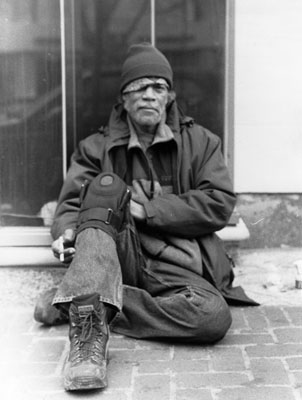All Nonfiction
- Bullying
- Books
- Academic
- Author Interviews
- Celebrity interviews
- College Articles
- College Essays
- Educator of the Year
- Heroes
- Interviews
- Memoir
- Personal Experience
- Sports
- Travel & Culture
All Opinions
- Bullying
- Current Events / Politics
- Discrimination
- Drugs / Alcohol / Smoking
- Entertainment / Celebrities
- Environment
- Love / Relationships
- Movies / Music / TV
- Pop Culture / Trends
- School / College
- Social Issues / Civics
- Spirituality / Religion
- Sports / Hobbies
All Hot Topics
- Bullying
- Community Service
- Environment
- Health
- Letters to the Editor
- Pride & Prejudice
- What Matters
- Back
Summer Guide
- Program Links
- Program Reviews
- Back
College Guide
- College Links
- College Reviews
- College Essays
- College Articles
- Back
Homelessness
Imagine being cold, not just cold, but freezing, having nowhere to go to get warm, and no family or friends to care for you. Imagine walking the streets with people ignoring your cries for help, and sleeping in the middle of a loud and crowded street. The epidemic that causes these effects, homelessness, must be stopped, or soon more people will suffer. Homeless people are not uncommon to see on the busy streets, because a recent survey concludes that nearly 2/3 thirds (nearly 385,600 people) that are homeless live in large metropolitan cities, where there are simply not enough houses to go around (Bringle 32).
People can suffer from homelessness as a result of many things, economic downturns, loss of loved ones, and loss of a business (Bringle 12). During an economic downturn, many people cannot afford to invest money; as a result, businesses struggle because people do not have the money to spend on goods. Also, when a close friend or relative has died, some people find it hard to find help and often become homeless soon after.
One may argue that people who are homeless should blame themselves for not working hard enough or not even getting a job, when really, 67% of homeless victims, struggle with learning disabilities and cannot receive a job (Barber 28). Furthermore, many more people have lost their privately owned businesses and had to sell them to care for their family, leaving them with no income of money, and having to sell their valuables and house for money.
According to the National Alliance to End Homelessness, “362,163 homeless victims are individuals on their own, and 216,197 people are with some sort of other family member or members.” (NAEH 1). Of the 362,163 individuals who are homeless, 23% of those are veterans returning from war. These veterans have simply no place to go after and, according to a poll conducted by the National Alliance to End Homelessness, 49% of these veterans will encounter drugs at one point after becoming homeless, however, only 8% will use these (NAEH 1).
Often, people like these are often ignored for fear that if one does if fact, give the homeless person money, that they will just buy alcohol and beg for more money. This is simply not true, as only 22% of homeless males reported that they have bought alcohol, after becoming homeless (Stearman 23). Many people who become homeless are not addicted to drugs or alcohol, they are just victims to a chain of unlucky events that have put them in the place that they are in now. For most homeless victims, drugs and alcohol are too expensive for them to use. The bigger problem that homeless victims suffer from is delayed development. Delayed development is when one does not learn as quickly and as efficiently as others. This is partly because the homeless are more stressed about where they will spend the night, or what they will eat, than actually learning information. To properly help the homeless, a U.K. study suggests, “Give the homeless food and water, instead of money, so you will not need to worry about them spending the money incorrectly.” (Stearman 35). Additionally, many charities are also providing shelter for the homeless, as well as providing adequate amount of food for all.
The struggle for victims of homelessness is certainly a huge obstacle to overcome, and many more will struggle with it in the future. In recent years, however, homelessness has had a downward trend by about 11% each year (NAEH 1). Whatever the outcome of this will be, there will always be people on the streets that need help from others to get back on their feet.

Similar Articles
JOIN THE DISCUSSION
This article has 0 comments.

This is an editorial about homlessness that i had written for a school project.